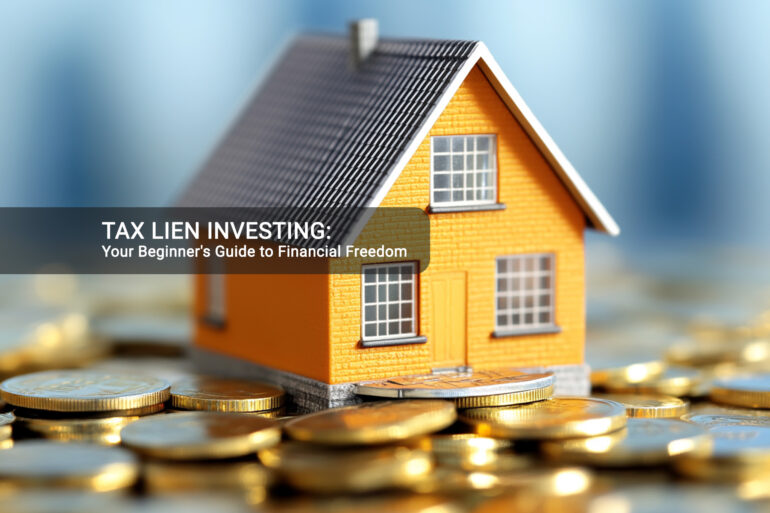TAX LIEN INVESTING: Your Beginner’s Guide to Financial Freedom
TAX LIEN INVESTING can be a lucrative pathway to financial independence. In this guide, a tax lien investor shares his transformative journey from airline pilot to investment expert, unraveling the essential concepts of tax lien certificates and how they can pave your way to wealth.
Table of Contents
- Starting Your Journey in Tax Lien Investing
- Navigating Redemption Period Rules
- Selecting the Right Properties for Investment
- The Need for Legal Representation in Tax Lien Investing
- Economic Factors Influencing Tax Lien Investments
- Frequently Asked Questions
Starting Your Journey in Tax Lien Investing
Embarking on your journey in TAX LIEN INVESTING requires a blend of research, strategy, and the right mindset. Begin by educating yourself about the local laws governing tax liens in your state. Each state has its own rules and regulations, which can significantly affect your investment’s profitability.
Start small. Consider investing in one or two tax lien certificates to get a feel for the process. As you gain experience, you can scale up your investments. Utilize resources such as local county websites and tax auction listings to find available certificates.
What is a Tax Lien Certificate?
A tax lien certificate represents a claim against a property due to unpaid property taxes. When property owners fail to pay their taxes, the local government places a lien on the property. The government then offers these liens for sale to investors in exchange for the outstanding tax amount plus interest.
Investors buy tax lien certificates to earn interest on the amount paid. The interest rates can vary significantly between states, often ranging from 8% to 36%. This mechanism not only allows local governments to collect overdue taxes but also provides a lucrative opportunity for investors.
Understanding Returns on Tax Lien Certificates
Returns on tax lien certificates can be quite attractive compared to traditional investment avenues. In many states, the interest accrued on these certificates is set at a fixed rate, which is determined during the auction process. It’s essential to understand how the redemption process works, as this will directly affect your returns.
Typically, the property owner has a specified period, known as the redemption period, to pay off their tax debt. If they do, you receive your initial investment back plus the interest. If they fail to pay, you may end up with the property, depending on local laws.
Assessing the Safety of Tax Lien Investing
Many investors view TAX LIEN INVESTING as a safe investment. The primary reason is that you’re investing with local governments, which have a vested interest in collecting taxes. The default rate among property owners is relatively low, with a high percentage of them ultimately paying their taxes.
However, due diligence is crucial. Not all properties are created equal. Ensure you research the property associated with the lien, including its condition and location. A thorough assessment can help you avoid investing in properties that may not yield the expected returns.
Identifying States with the Best Returns
Different states offer varying interest rates for tax lien certificates. Some states, like Florida and Arizona, are known for their higher rates, often exceeding 18%. Researching and identifying these states can significantly enhance your investment strategy.
Additionally, consider the redemption period and any other local regulations that may impact your investment. Understanding these nuances can help you make informed decisions and maximize your returns.
GET A REAL TAX LIEN MENTOR!
Click below to begin your journey to massive passive income!
Navigating Redemption Period Rules
Understanding the redemption period is crucial in TAX LIEN INVESTING. This is the time frame during which the property owner can pay off their tax debt and reclaim their property. Each state has its own regulations regarding the length of this period, typically ranging from one to three years.
During this time, if the owner pays the owed taxes, you, as the investor, receive your initial investment back along with the accrued interest. However, if they fail to pay, you may have the opportunity to acquire the property, depending on local laws.
Key Considerations for Redemption Periods
- State Regulations: Always check the specific rules in your state to understand the redemption timeline.
- Property Type: Different types of properties may have varying redemption periods. For instance, residential properties often have longer periods compared to commercial properties.
- Local Auctions: Keep an eye on local tax lien auctions for updates on redemption periods that may affect your investments.
Selecting the Right Properties for Investment
Choosing the right properties is a fundamental aspect of successful TAX LIEN INVESTING. Not all properties are created equal, and thorough due diligence is necessary to ensure your investment yields positive returns.
Steps to Select Properties
- Research the Neighborhood: Look for properties in desirable locations. A good neighborhood increases the likelihood of property owners paying their taxes.
- Analyze Property Value: Assess the market value of the property compared to the amount of tax owed. This will help you gauge potential returns.
- Inspect the Property: Whenever possible, visit the property to check its condition. This can prevent investing in properties that may require significant repairs.
- Check for Other Liens: Investigate if there are additional liens on the property that could complicate your investment.
The Need for Legal Representation in Tax Lien Investing
While many aspects of TAX LIEN INVESTING can be managed independently, having legal representation can provide significant advantages. An attorney knowledgeable in tax lien laws can help navigate complex regulations and protect your interests.
Benefits of Legal Representation
- Understanding Local Laws: A lawyer can clarify the specific laws governing tax liens in your state, ensuring compliance.
- Assistance with Auctions: Legal experts can assist in reviewing auction documents and contracts to mitigate risks.
- Property Disputes: If disputes arise regarding property ownership or liens, legal counsel can provide representation and advice.
Economic Factors Influencing Tax Lien Investments
The broader economic environment plays a significant role in TAX LIEN INVESTING. Factors such as interest rates, property values, and local employment rates can influence the success of your investment strategy.
Key Economic Indicators to Monitor
- Interest Rates: Higher interest rates may discourage borrowing, impacting property values and owners’ ability to pay taxes.
- Local Job Market: A strong job market typically leads to timely tax payments, while economic downturns can increase defaults.
- Real Estate Trends: Keep an eye on local real estate trends to identify areas with rising property values, which may indicate a healthy investment climate.
Frequently Asked Questions
What happens if the property owner never pays their taxes?
If the property owner fails to pay their taxes within the redemption period, you may have the opportunity to acquire the property, depending on state laws. Always investigate local regulations to understand your rights in this situation.
How much money do I need to start investing?
You can begin investing in tax lien certificates with relatively low amounts, often starting around $50. However, to see meaningful returns, consider starting with at least $5,000 to $10,000.
Can I invest in tax liens out of state?
Yes, you can invest in tax liens in different states, but it is crucial to familiarize yourself with the specific laws and regulations in those states. Online resources and county websites can provide valuable information.
Is tax lien investing a passive investment?
While tax lien investing can be relatively passive, it still requires due diligence. Investors should actively research properties and monitor their investments to maximize returns.
Conclusion
As you navigate the world of TAX LIEN INVESTING, remember that knowledge is your most powerful tool. Equip yourself with information, start small, and gradually expand your portfolio as you gain confidence and experience. The potential for financial transformation through tax lien investing is substantial, and with the right approach, you can achieve your investment goals.








